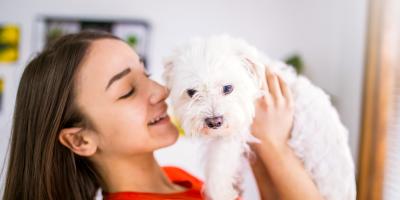As puppies grow and change, so do their energy levels and behaviors. Feeding a complete and balanced puppy food can help your puppy maintain appropriate energy levels for their current age.
Here’s how much energy you can expect your puppy to have at various ages.
From Birth to 10 Weeks
During these early stages of your puppy’s life, they’re a lot like babies. They have boundless energy and curiosity.
They spend most of their day playing and learning the foundations of being a dog: chasing, running, pawing, biting and fighting. Their enthusiasm for life and its surroundings can be exhausting, but this is also the perfect time to start thinking about puppy care and training.
From 10 to 16 Weeks
Puppies at this age may still have a lot of playful energy. They are also starting to test their boundaries. Like teenagers, they may seem to “forget” the rules or commands they once followed.
This is normal developmental behavior for puppies in this juvenile phase. Some of the behavior may be due to teething as puppies begin to lose their first set of teeth around three to four months of age.
From 4 to 6 Months
You may notice your puppy likes to play-fight with other dogs around this age. This is how puppies start to identify where they fit in with a group. This is expected behavior.
It’s also around this age when some puppies show fear. If your puppy does show fear, it’s best to ignore the behavior and build their confidence through training and positive experiences.
From 6 to 12 Months
While your puppy may now look like a full-grown adult dog, he’s still a puppy. At this age, you might see bursts of puppy energy levels and continued boundary testing.
That’s why it’s essential to make sure your puppy still gets plenty of structured play and exercise. Training and socialization with other dogs are continued necessities.
From 1 to 2 Years
Congratulations! Your dog has graduated from puppyhood. As your puppy nears age one (up to two years for a large breed), they’re beginning to look and act more mature. They will probably still be playful, but now they’ve learned the ropes and are much better at following the rules.
What if My Puppy Has Too Much Energy?
Some puppies are more energetic than others, which can depend on the breed or the puppy’s individual personality. The answer is often as simple as making sure they get lots of exercise and activities to tire them out physically and mentally.
That could mean games of fetch, enrichment games or long walks. Most importantly, use their energy and natural curiosity to train them and build a foundation for good behavior in the long term. If you’re concerned about your puppy being too energetic, talk with your veterinarian for more tailored advice.
What if My Dog’s Energy Level is Low?
While some puppies are more laid back than others, lethargy (low energy) is sometimes indicative of a health issue. Anything from an infection to pain to obesity can cause lethargy. If your puppy seems unusually lethargic, call your veterinarian to find out the root cause.
Learn more about puppies and adult dogs from our pet experts on our Pet Expertise page.

Be Rewarded for Your Purina Purchases
Earn and redeem points for Purina products with myPurina app.








